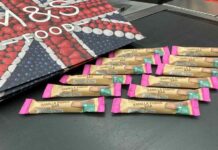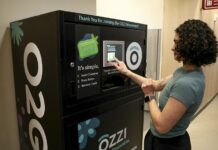DIGITAL deposit return scheme innovator, Polytag, has developed UV tag reading technology which it said will enable brands to trace packaging through the circular economy.
It added that the new technology will allow brands, legislators, and recycling operators to trace plastic packaging through the circular economy with ‘far-reaching’ benefits for recycling rates in the UK.
The technology, developed in partnership with researchers at the Advanced Manufacturing Research Centre, will provide stakeholders in the packaging supply chain with access to ‘never-before-seen’ packaging lifecycle data – including where and when it was produced, and the percentage of recycled materials it contains.
The two-part technology consists of UV 2D printing capabilities and a UV tag reader, a ‘fully ruggedised’ unit installed in recycling centres. Polytag said both parts are low-cost and easily retrofitted onto existing label printing systems and recycling detection systems respectively.
With Extended Producer Responsibility (EPR) having already come into effect, brands classed as obligated packaging producers are required to benchmark their progress. Polytag added the technology is expected to aid compliance by providing brands with the data to easily ‘describe, tag, and trace’ plastic packaging through the circular economy, while also streamlining packaging and recycling operations.
The start-up added that legislators will be able to measure business liabilities and enforce legislation by being able to identify the ownership of plastic packaging, while local authorities and recycling centres can capture real-time data on packaging composition and breakdown, which in turn could help to inform recycling strategy, investment in sorting and recovery equipment, and onward tracking of materials.
Furthermore, by generating and tracking a grid of UV 2D Data Matrix applied at the plate printing stage, Polytag said the solution has made the delivery of a digital deposit return scheme (DDRS) a reality. It explained that, not only does this aid traceability of packaging material in DRS counting houses and in existing recycling facilities, but it acts as a ‘mass balance’ cross-check to support with accurate reporting and fraud prevention.
Alice Rackley, CEO of Polytag, said, “We are driven by the belief that what gets measured gets managed, and that reversing stagnating recycling rates will require us to stop guessing and start knowing how much and what type of packaging is being recycled. Fortunately, our new technology will provide stakeholders with the never-before-seen data to do just that.”
Retailers Co-op and Ocado have already partnered with Polytag. Later this year, the UV tags will be printed on to the labels of Co-op’s two-litre own-brand spring water bottles and detected by Polytag’s UV tag reader at the Abergele Recycling Centre in North Wales. The retailer will acquire data including the exact number of plastic containers sorted, handled and recycled, and will use it to help measure the success of initiatives designed to improve recycling rates over time.




























